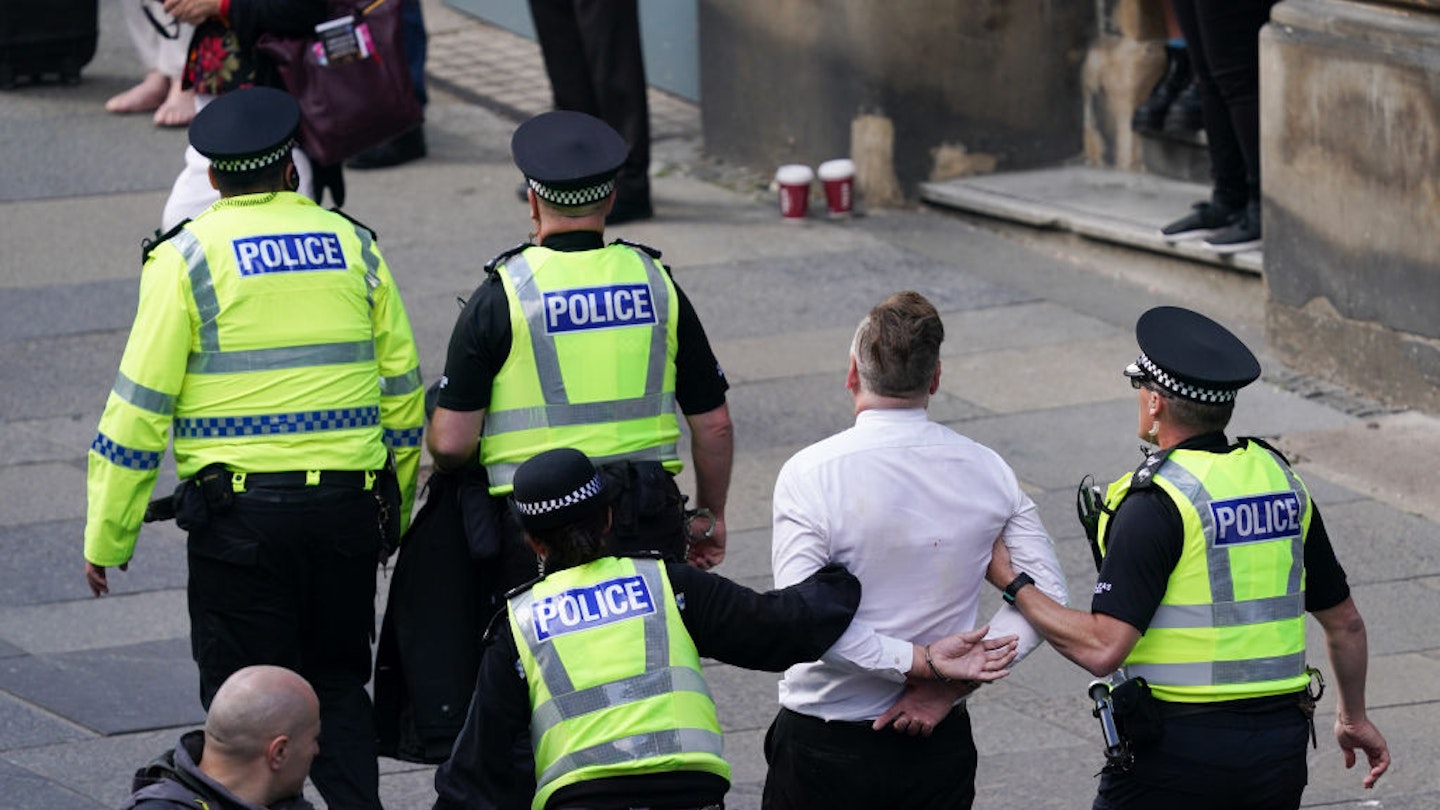Today the Queen’s coffin will travel from Edinburgh airport to London, to spend the night at Buckingham Palace before a procession will deliver it to Westminster Hall on Wednesday, where it will lie in state for four days.
Already we’ve seen major displays of wealth and ceremony as long-standing plans for the death of the Queen begin to come into play. In Scotland, mourners have already lined the streets to pay their respects as the procession made its way along the Royal Mile, from The Palace of Hollyroodhouse to St Giles Cathedral – and if you’ve seen the footage, it’s likely you didn’t miss the lone protester who vocally objected to Prince Andrew’s role in the procession.
The heckler, known only as Rory, could be heard shouting, ‘Andrew, you’re a sick old man!’ before he was pulled from the crowds by two men and arrested under the charges of ‘a breach of the peace’. Speaking to reporters in the immediate aftermath of his arrest, Rory said, ‘powerful men shouldn’t be allowed to commit sexual crimes and get away with it.’
Earlier this year, Prince Andrew – the second and reportedly favourite son of Queen Elizabeth, agreed an out of court settlement with Virginia Giuffre, an American woman who had been a victim of convicted sex offender Jeffrey Epstein and who had accused Andrew of sexually abusing her when she was a teenager. Andrew denied any wrongdoing and was not found guilty of criminal wrongdoing, but he was stripped of his military titles and removed by the Queen from public duties.
Rory isn’t the only person to be arrested or forcibly removed after making a statement at public gatherings and processions following the Queen’s death. Also arrested during proceedings in Edinburgh was a 22-year-old woman, who remains unnamed, who held up a sign saying ‘Fuck imperialism, abolish the monarchy’. She was held and charged under the same breach as Rory, and is awaiting sentencing at a later date. She could face up to 12 months in prison or a charge of £5,000 – or, if she’s really unlucky, five years imprisonment and a fine.
In Oxford, a man called Symon Hill was arrested – and subsequently de-arrested – for asking ‘who elected him?’ at a proclamation of the King ceremony. Thames Valley police released a statement saying: ‘A 45-year-old man was arrested in connection with a disturbance that was caused during the county proclamation ceremony of King Charles III in Oxford.
‘He has subsequently been de-arrested and is engaging with us voluntarily as we investigate a public order offence’ – this last point is refuted by Hill, who said he’d not engaged with them since his arrest.
A fourth person, Paul Powlesland, wrote on Twitter, ‘Just went to Parliament Square [and] held up a blank piece of paper. Officer came [and] asked for my details. He confirmed that if I wrote “Not My King” on it, he would arrest me under the Public Order Act because someone might be offended.’
What is the Public Order Act?
Regardless of the specifics of their protesting, all arrests that have been made over the last few days in relation to the Queen’s death have been done so under the Public Order Act of 1986. According to the government website, ‘A person is guilty of an offence if he — (a) uses threatening [or abusive] words or behaviour, or disorderly behaviour, or (b) displays any writing, sign or other visible representation which is threatening [or abusive], within the hearing or sight of a person likely to be caused harassment, alarm or distress thereby.’
The Police, Crime, Sentencing and Court Act has further compounded the severity with which these mild protestations have been treated, by giving the police more power to make arrests.
It’s all combined to form the perfect storm, with many questioning whether our democracy actually does extend to criticising the monarchy, with the nature of these arrests akin to charges of treason – indeed, advocating for the abolishment of the monarchy in any form (including, unfortunately, holding up a sign) could still technically be charged as treason under the Treason Felony Act of 1848.
While it’s a fraught time in our country’s history and emotions are running high, one could argue that the point of protest that it’s visible and has the potential to enact change. With the entire world’s spotlight on the UK at the moment, it’s vital that we uphold core values of democracy and not silence the voices that challenge the status quo.
It remains a major criticism of the Police and Sentencing Bill, which promised to ‘to make provision about the powers of the police and other authorities for the purposes of preventing, detecting, investigating or prosecuting crime or investigating other matters’ and ‘to make provision about the maintenance of public order’, that new police powers could negatively impact our democratic right to protest. With the death of the Queen and the stirring up of long held animosity between royalists and republicans, we must be careful not to set a precedent when it comes to censoring dissent.
